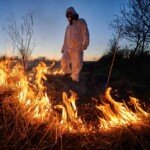How to Stay Safe and Plan a Trip in Wild Fire Season
It’s wildfire season in British Columbia — so we want you to plan your trip for both enjoyment and safety.
Wildfires can affect travel plans in various ways, such as causing road closures, park restrictions, evacuation orders, flight delays, and health problems. Therefore, it is important for tourists and travelers to be aware of the fire season in B.C. and plan their trips accordingly. Here are some tips and advice on how to plan a trip and stay safe in B.C.’s fire season.
Know the fire season
The fire season in B.C. usually runs from May to September, but it can vary depending on weather conditions and climate change. According to the BC Wildfire Service, the 2023 fire season has been one of the most active and destructive ones in recent history, with over 1,500 wildfires burning more than 500,000 hectares of land as of August 11. The majority of these wildfires were caused by lightning strikes, but some were also caused by human activities, such as campfires, cigarettes, or vehicles.
Fire season can affect travel plans in various ways, such as forcing road closures, imposing park restrictions, and issuing evacuation orders. For example, Highway 1, the main route connecting Vancouver and Calgary, was closed for several days in July due to a wildfire near Lytton. Similarly, several provincial parks and recreation sites were closed or partially closed due to wildfire risks or activities. Moreover, some communities and regions were placed under evacuation alerts or orders due to the proximity or threat of wildfires.
To avoid or minimize travel disruptions due to wildfires, it is advisable to check the fire danger ratings, which indicate the level of risk of fire ignition and spread in different areas of the province. It is also recommended to avoid travelling to high-risk areas or areas under evacuation alerts or orders. Moreover, it is wise to have flexible itineraries and alternative routes or destinations in case of unexpected changes or cancellations.
Stay informed and follow instructions
One of the most important things to do when traveling during fire season is to stay informed and follow instructions from officials. There are several reliable sources of information on wildfire activity and status in B.C., such as the BC Wildfire Service website, which provides daily updates on wildfire locations, sizes, causes, and statuses. The Emergency Info BC website also provides information on emergency alerts and orders, as well as public safety advisories and resources. Additionally, local authorities and media outlets can provide more specific and timely information on wildfire situations and impacts in different regions and communities.
To access and use these sources of information effectively, it is advisable to subscribe to notifications or alerts via email or text message from the BC Wildfire Service or Emergency Info BC. It is also helpful to follow their social media accounts on Twitter or Facebook for regular updates and reminders. Furthermore, it is useful to contact their phone numbers for inquiries or reports on wildfires or emergencies. The BC Wildfire Service phone number is 1-800-663-5555 or *5555 on most cellular networks. The Emergency Info BC phone number is 1-800-663-3456.
Staying informed and following instructions from officials during a wildfire event is crucial for ensuring one’s safety and well-being. It is imperative to comply with any evacuation alerts or orders that may be issued for certain areas or communities due to wildfire risks or impacts. It is also important to respect any road closures or park restrictions that may be imposed due to wildfire activities or operations. Moreover, it is essential to heed any public safety advisories or recommendations that may be given regarding air quality, health effects, or emergency preparedness.
Protect yourself from financial losses or inconveniences
Another thing to consider when planning a trip around wildfires in B.C. is how to protect oneself from financial losses or inconveniences that may result from trip cancellations or postponements due to wildfires. There are different cancellation policies that may apply to various travel services and products, such as airlines, hotels, car rentals, or tour operators. These policies may vary depending on the type of service or product, the booking method, the terms and conditions, and the reason for cancellation.
To protect oneself from financial losses or inconveniences due to trip cancellations or postponements caused by wildfires, it is advisable to purchase travel insurance that covers such scenarios. Travel insurance can provide coverage for expenses incurred due to trip interruptions or delays caused by unforeseen events such as natural disasters. However, not all travel insurance policies are the same, and some may have exclusions or limitations for wildfire-related claims. Therefore, it is important to read the policy wording carefully and understand what is covered and what is not before buying travel insurance.
Another way to protect oneself from financial losses or inconveniences due to trip cancellations or postponements caused by wildfires is to read the terms and conditions of the travel services or products that one intends to book or purchase. These terms and conditions may specify the cancellation policies, fees, penalties, or refunds that may apply in case of changes or cancellations due to wildfires or other reasons. It is also advisable to contact the service providers directly and ask them about their cancellation policies and procedures in case of wildfires or emergencies.
Monitor and reduce exposure to wildfire smoke
Wildfire smoke is a mixture of gases and particles that are produced by burning vegetation and other materials. Wildfire smoke can affect air quality and health in various ways, depending on the type, amount, and duration of exposure. One of the most common and harmful air pollutants in wildfire smoke is fine particulate matter (PM2.5), which are tiny particles that can penetrate deep into the lungs and cause health problems such as eye irritation, coughing, wheezing, shortness of breath, asthma attacks, or cardiovascular distress.
To monitor and reduce exposure to wildfire smoke, it is advisable to check the air quality advisories that are issued by Environment and Climate Change Canada (ECCC) when the air quality index (AQI) reaches or exceeds 4 (moderate risk) on a scale of 1 to 10. The AQI is a measure of the level of air pollution in a given area at a given time. The AQI can be accessed online through the ECCC website or through various apps or widgets that display the AQI for different locations.
To reduce exposure to wildfire smoke, it is recommended to stay indoors as much as possible when the AQI is high or when there is visible smoke in the air. It is also suggested to avoid physical exertion or outdoor activities that may increase breathing rate or inhalation of smoke. Moreover, it is important to keep hydrated and drink plenty of water to help flush out any toxins or irritants from the body. Additionally, it may be helpful to use air filters or purifiers that can remove PM2.5 from indoor air, or wear masks or respirators that can filter PM2.5 from outdoor air.
Seek medical attention or assistance if needed
Wildfire smoke can have different health effects on different people, depending on their age, health status, pre-existing conditions, and sensitivity to smoke. Some people may experience more severe or longer-lasting health effects than others, such as children, elderly, pregnant women, smokers, or people with chronic respiratory or cardiovascular diseases. Therefore, it is important to seek medical attention or assistance if needed due to wildfire smoke exposure.
To seek medical attention or assistance due to wildfire smoke exposure, it is advisable to call 8-1-1 for non-emergency advice. 8-1-1 is a free-of-charge provincial health information and advice phone line operated by HealthLink BC. By calling 8-1-1, one can speak to a registered nurse, a registered dietitian, a qualified exercise professional, or a pharmacist for health information and advice on various topics, including wildfire smoke exposure.
For emergency situations that require immediate medical attention, such as difficulty breathing, chest pain, fainting, or severe allergic reactions due to wildfire smoke exposure, it is imperative to call 9-1-1. 9-1-1 is a universal emergency telephone number that connects callers to emergency services such as police, fire, or ambulance. By calling 9-1-1, one can receive urgent medical assistance from paramedics or firefighters who are trained and equipped to deal with wildfire smoke-related emergencies.
Prepare for a possible wildfire emergency
While wildfires are unpredictable and uncontrollable natural events that can occur anywhere and anytime in B.C., there are some steps that one can take to prepare for a possible wildfire emergency. These steps include making a household plan, building an emergency kit, and connecting with neighbours.
Making a household plan involves identifying the risks and hazards that one may face in case of a wildfire emergency, such as evacuation alerts or orders, power outages, communication disruptions, or property damage. It also involves discussing with household members how to respond to these risks and hazards, such as where to go, what to do.



